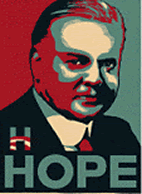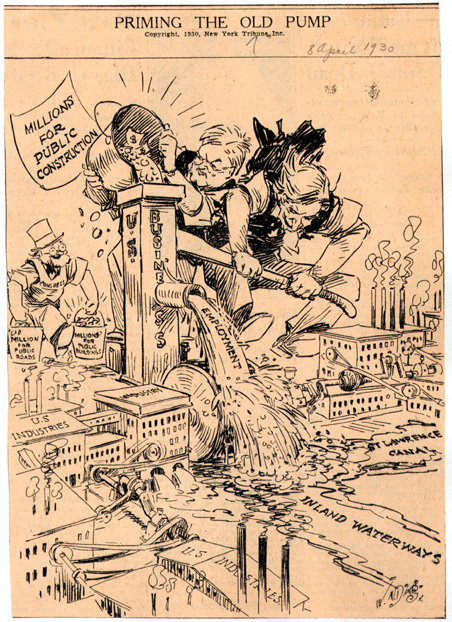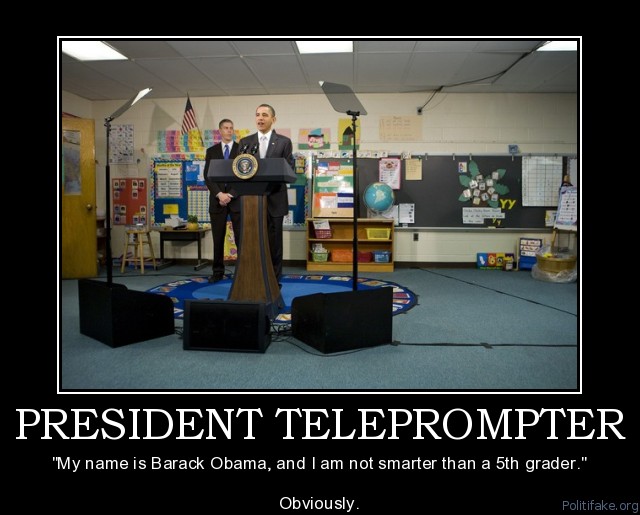Obama and Hoover: Two "Smart" (Stupid) Presidents
Jonathan Bean is Research Fellow at the Independent Institute, Professor of History at Southern Illinois University, and editor of the book, Race and Liberty in America: The Essential Reader.

[Crosspost from Beacon]
For the past year, I have been researching how the housing bubble of the 1920s contributed to the Great Depression. My study involves reading many articles and speeches by Herbert Hoover, first as Commerce Secretary (1921-1928) then as president (1929-1933). As the nation endures the Obama presidency, I see much in common between the two men, both seen as "smart" by their supporters.
We forget that Hoover had a "titanic intellect," a stellar career as a mining engineer, translated medieval manuscripts into English, and wrote the textbook Principles of Mining. He helped orchestrate relief aid to save millions from hunger and starvation across post-World War I Europe. During the 1920s, he was a "progressive" busybody telling businessmen in all fields how they could make their work more efficient. His Commerce Department held 2,500 trade association meetings. One of those associations—the American Construction Council—was headed by trade lobbyist Franklin Delano Roosevelt.
No, I am not making this up! FDR thought Hoover's "smart" approach to jawboning business was an improvement upon competitive capitalism.
Barack Obama can't boast that kind of record (he achieved very little before becoming president) but he shares the same cast of mind as Hoover: In a recent Wall Street Journal article, "Is Obama Smart?," Bret Stephens concludes that
a) Obama (like Hoover) thinks he is smarter than those who run businesses; but
b) "stupid is as stupid does."
As their "smart" policies failed year after year, Hoover and Obama dug in and blamed the international environment ("economic headwinds"). Note to readers: contrary to myth, historians now accept that Hoover was an extremely active president who increased spending by 50%, ran deficits and promoted what we would later call Keynesian policies: cutting taxes (to stimulate purchasing power), encouraging public works (infrastructure) and bailing out banks (Reconstruction Finance Corporation). He also revived antitrust after it lay dormant for a decade. Sound familiar? Here is a cartoon lampooning his "stimulus" approach (then called "priming the pump").
In both cases, many businessmen (and now businesswomen) were skeptical of candidates Hoover and Obama. Obviously, there are differences, but note the similarity between the "know-it-all" attitude of these two men, particularly in areas where they knew very little. The first excerpt is from "Wall Street Looks at Hoover" in Outlook magazine (1928), with a reporter interviewing a businessman-banker as to why so many businessmen opposed Hoover's candidacy in 1928. The second excerpt is from the Wall Street Journal article above (collecting statements by and about Obama's "really smart" qualities).
Hoover 1928:
The Outlook reporter anonymously interviewed a prominent banker as to why business was opposed to Hoover, a "smart" candidate who mesmerized the the country with how he would engineer permanent prosperity.
Banker: My firm "has many textile manufacturers as clients . . . but nobody in the bank would presume to tell our customers how to make rayon." Yet Hoover is "confident that he knows more about finance than financiers, more about industry than industrialists, and more about agriculture than agriculturists. He is so sure of his judgment in these fields that he wants to impress it on others. He is very seldom willing to take advice. Since he knows more than any advisers could, why should he?"
"[Hoover's] cast of mind will handicap him . . . . Because of his confidence in his own wisdom he is suspicious of those who disagree with him."
"We object, moreover, not only to his ignoring our advice. We object to his offering us his advice on matters that are none of his business." [Banker notes how Hoover's Commerce Department urged business to invest in certain industries or areas]. "It is not our function as bankers to tell our customers with whom they should do business."
Obama 2008:
"'I think I'm a better speech writer than my speech writers,'" [Obama] reportedly told an aide in 2008. ' I know more about policies on any particular issue than my policy directors. And I'll tell you right now that I'm . . . a better political director than my political director.'"
Stephens writes: "How many times have we heard it said that Mr. Obama is the smartest president ever? Even when he's criticized, his failures are usually chalked up to his supposed brilliance. Liberals say he's too cerebral for the Beltway rough-and-tumble. . . ."
"Socrates taught that wisdom begins in the recognition of how little we know. Mr. Obama is perpetually intent on telling us how much he knows. Aristotle wrote that the type of intelligence most needed in politics is prudence, which in turn requires experience. Mr. Obama came to office with no experience."
Much is made of the president's rhetorical gifts. This is the sort of thing that can be credited only by people who think that a command of English syntax is a mark of great intellectual distinction. Can anyone recall a memorable phrase from one of Mr. Obama's big speeches that didn't amount to cliché?"
We have now reached the point where many Americans, even those who voted for Obama, share the attitude of those disillusioned with Hoover: In 1931, they recalled how they felt just three years prior: Hoover seemed so wonderful! He promised to end poverty in our time! And he seemed so smart! But now he beats us down (if we are in business) and his speeches feel robotic, much like the "Hall of Presidents" with the "Audio-Anatromic" figure of Abraham Lincoln motioning stiffly to the audience.
Perhaps, someday, that Hall of Presidents will have a new figure—President Obama's teleprompter, now the butt of jokes and running commentary on the president's day-to-day failings.
We all know how well Hoover did in practice. It's starting to look like "deja vu all over again."
*****
Recommended Reading:
Joan Hoff Wilson, Herbert Hoover: The Forgotten Progressive (1975)
"The American Presidency Project": splendid site to compare the reactions of Hoover and Obama to stock market crashes, bailouts, the international environment and much more.

